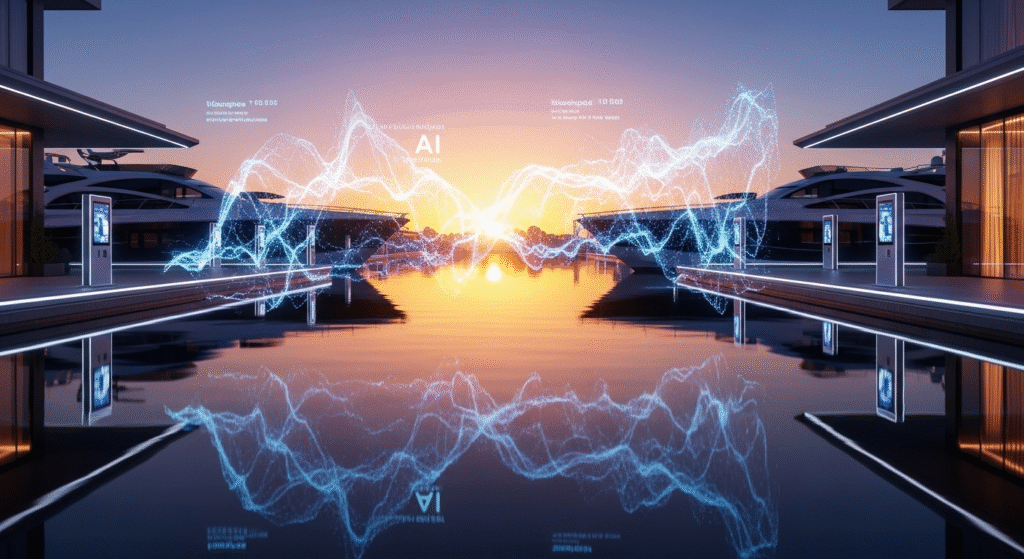Boats Don’t Sell Themselves — But AI Might Just Change That


The Tide Is Turning
Not long ago, selling a boat meant shaking hands at the marina or handing out glossy brochures at boat shows. Buyers wanted to touch the vessel, smell the salt air, and talk to someone who “knew their stuff.”
Today, that same journey begins with a voice command or a chatbot. The modern customer simply asks:
“What’s the best family cruiser under $200k that’s easy to maintain?”
This small change in how people search has enormous consequences. Buyers are no longer typing short keywords like “boats for sale Sydney.” They’re speaking naturally, asking full questions — and expecting intelligent, instant answers.
In other words, the sales conversation now starts online, often before a buyer even knows which brand they want. That’s where AI search comes in — and it’s quietly reshaping the marine industry.
From Listings to Listening — The AI Search Revolution
Artificial intelligence is no longer a buzzword; it’s the new gatekeeper of visibility.
In 2025, analysts estimate that over 60% of boat buyers will interact with AI assistants such as ChatGPT, Google’s AI Overview, or Bing Copilot during their research phase.
These AI systems scan millions of pages to find the most helpful, context-rich information — and deliver those answers directly to users. That means your website isn’t competing for “clicks” anymore; it’s competing for inclusion in the answer itself.
If your business isn’t structured to feed that AI ecosystem, your boats might not even appear in those recommendations. That’s the difference between being visible and being invisible in tomorrow’s marketplace.
Optimising for AI Discovery
So, how can a marine business make sure it’s not left behind?
Let’s break down the key steps to becoming AI-visible.
1. Speak the Customer’s Language
Forget robotic keyword stuffing. Write conversationally — like how buyers actually ask questions. For instance:
- “What size boat is best for weekend fishing?”
- “Are aluminium hulls better than fibreglass?”
Content that answers these kinds of queries directly performs better in AI-driven search.
2. Add Structured Data
Schema markup helps search engines understand what your pages contain — product details, pricing, reviews, availability, and locations. When your boat listings include structured data, AI can display them more accurately in responses.
3. Publish Expert Insights
Google’s AI Overview and Bing Copilot prefer trustworthy, authoritative sources. Regularly share knowledge about maintenance tips, propulsion comparisons, and hull design advantages. These expert articles prove your real-world experience.
4. Strengthen Local Presence
Most marine purchases still happen locally. Optimise your Google Business Profile with photos, detailed descriptions, and customer reviews. Voice search often prioritises local results, so proximity and credibility go hand-in-hand.
When Data Meets the Dock
Let’s see how this plays out in the real world.
A Sydney-based boat dealership collaborated with Disrupta Marine Marketing to transform its online strategy. Instead of relying solely on inventory pages, the dealership began publishing buyer-friendly content such as:
“What’s the difference between a cuddy cabin and a bowrider?”
Within three months, they saw:
- A 62% increase in organic search traffic
- Double the number of voice-based enquiries
- A measurable rise in test-drive bookings
This shift wasn’t about adding more ads. It was about answering the questions that AI (and real people) were already asking.
Visibility Comes Before Velocity
AI doesn’t care how flashy your website looks or how big your ad budget is. It cares about relevance and clarity.
When someone asks,
“Which boat brand holds its value the longest?”
“How often should I service a diesel inboard engine?”
AI tools like Google’s SGE choose the most useful, well-structured content to show first. That’s how authority and trust are built online — one clear, useful answer at a time.
The more your brand’s content satisfies buyer intent, the more the algorithms reward you with visibility. And visibility, in the digital world, is the new currency of sales.
Beyond SEO — Building Trust Digitally
Marine buyers are emotionally driven. They’re not just purchasing a boat; they’re buying freedom, adventure, and identity. AI-driven marketing doesn’t remove that emotion — it amplifies it by connecting the right message to the right person at the right time.
A dealership that understands both search behaviour and human behaviour will outperform one that still relies on cold calls and brochures.
This is where Disrupta Marine Marketing’s philosophy — “We are your customer” — becomes more than a tagline. It’s a reminder that digital marketing must feel authentic, personal, and helpful, even when powered by algorithms.
Related Reading (Internal Link)
For more insights into digital transformation, check out this article on marketing automation available right here on GetTopLists.
Adapt or Drift
The tide has turned, and it’s not waiting for anyone. Dealers who cling to traditional marketing will slowly watch their leads drift elsewhere. Those who embrace AI-ready SEO, structured content, and conversational engagement will stay ahead of the wave.
In 2025 and beyond, it’s not about shouting louder — it’s about being found first.
That’s the silent revolution happening beneath the surface of the marine industry.
Anchor Link:
Learn how Disrupta Marine Marketing helps marine brands dominate AI-driven search results through real strategy, not guesswork.



